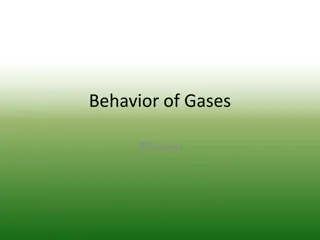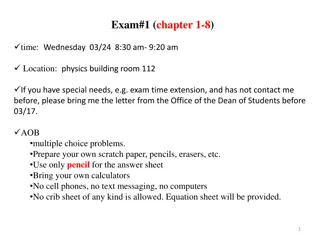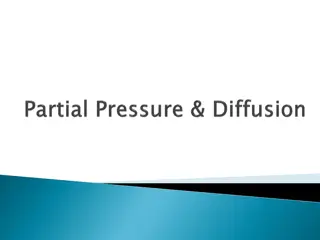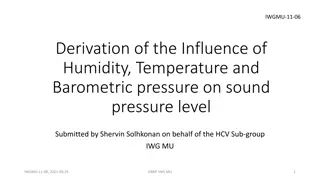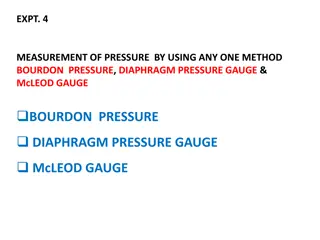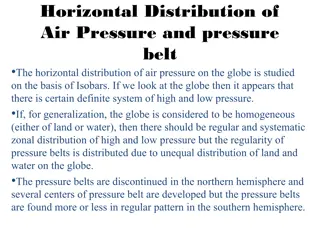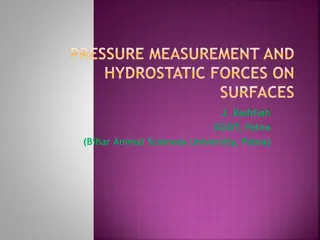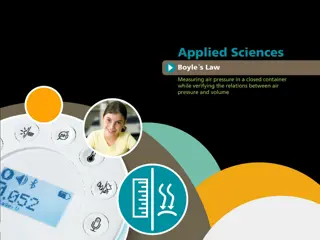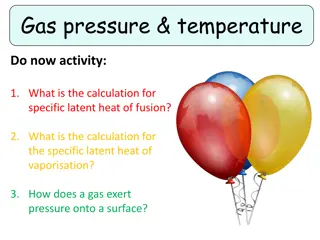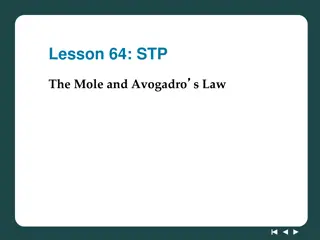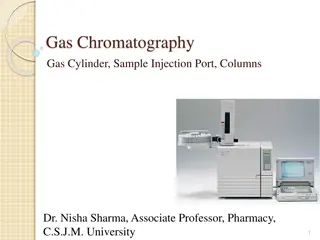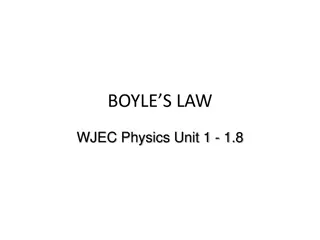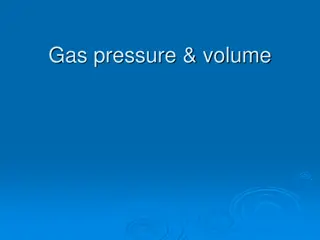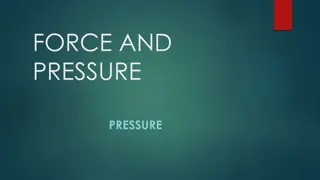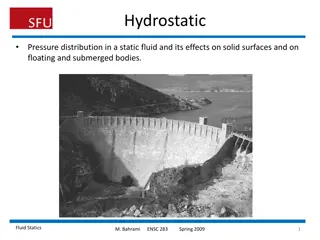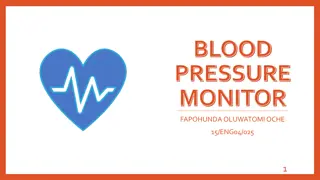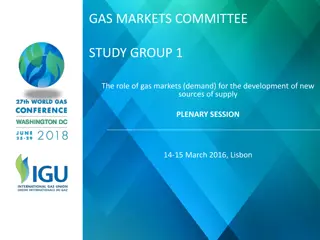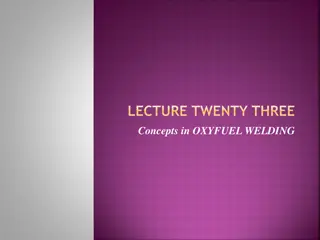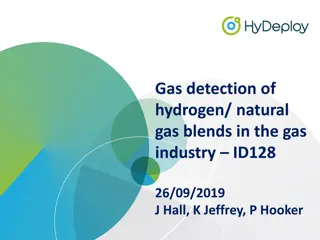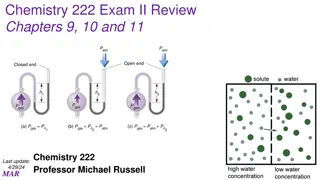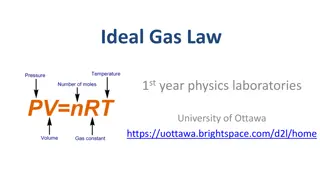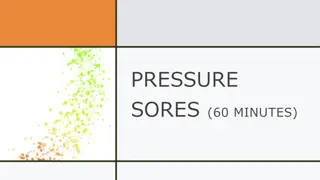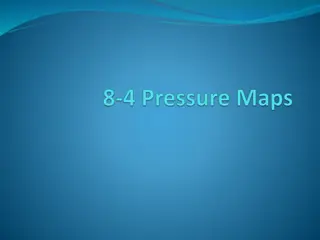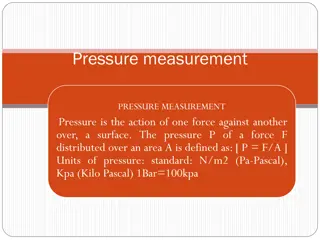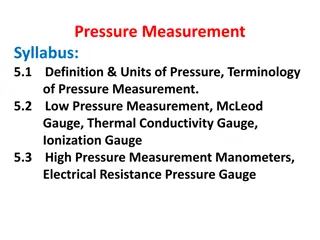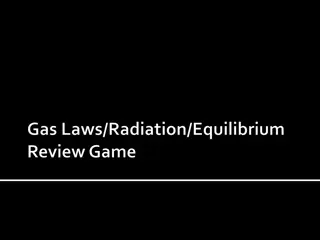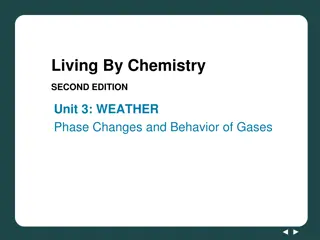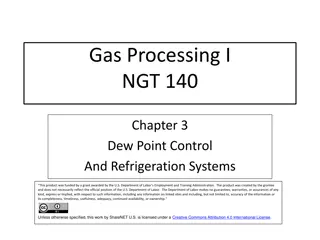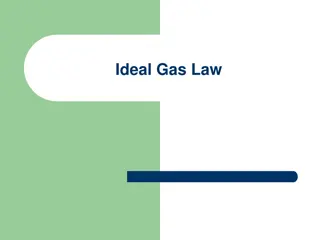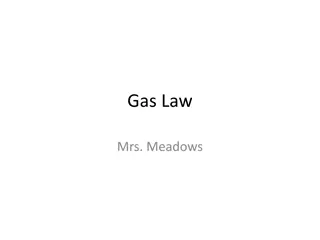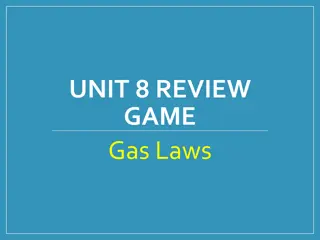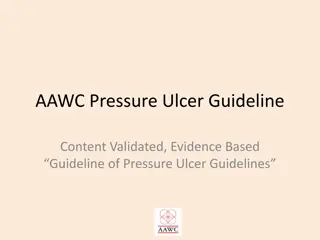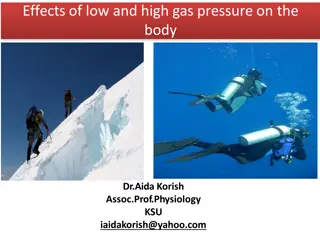Gas meters market
A gas meter is driven by the force of the moving gas in the pipe. Each time the dial with the lower value complete one revolution, the pointer on the next higher value dial moves ahead one digit. These meters are essential for ensuring adequate gas pressure from the main supply of natural or liquefi
2 views • 6 slides
Understanding Fluid Pressure in Oil Field Hydraulics
Explore the fundamentals of fluid pressure including pressure basics, unit conversion, fluid weight constants, true vertical depth, and hydrostatic pressure in the context of oil and gas technology programs. Learn how to calculate pressure gradients, understand the impact of fluid density on pressur
1 views • 40 slides
Gas Behavior Review
Review key concepts related to the behavior of gases, including characteristics of gases, properties at standard conditions, the kinetic molecular theory, and factors affecting gas pressure. Test your knowledge with true or false questions and learn about gas compression, gas movement in aerosol can
0 views • 17 slides
Understanding Atmospheric Pressure and Gas Behavior
Exploring atmospheric pressure's impact on gas behavior, including Torricelli's barometer and Boyle's Law. Learn about gas volume changes with pressure variations and buoyant force principles. Prepare for Exam #1 covering chapters 1-8.
0 views • 32 slides
Gas Laws and Properties: Understanding the Behavior of Gases
Gas laws govern the behavior of gases and their properties in various conditions. From the total pressure of gas mixtures to calculating partial pressures, understanding the relationship between pressure, volume, temperature, and amount of gas is crucial. Effusion and diffusion play key roles in how
0 views • 16 slides
Influence of Environmental Factors on Sound Pressure Levels
In this study, the relationship between sound pressure, particle velocity, and the acoustic impedance is explored in the context of varying humidity, temperature, and barometric pressure. The ideal gas law is used to determine the density of both dry and humid air, considering parameters such as par
1 views • 14 slides
Measurement Methods for Pressure Evaluation
The content describes the measurement of pressure using various methods such as Bourdon pressure gauge, diaphragm pressure gauge, and McLeod gauge. It explains the principle of McLeod vacuum gauge, the operation of the gauge, and the components involved. The McLeod gauge works by compressing a known
2 views • 27 slides
Understanding Horizontal Distribution of Air Pressure and Pressure Belts on the Globe
The horizontal distribution of air pressure and pressure belts on Earth is characterized by isobars, indicative of high and low pressure systems. The regular zonal distribution of pressure belts is affected by the uneven distribution of land and water. Pressure belts are not solely induced by temper
1 views • 7 slides
Understanding Pressure Measurement and Hydrostatic Forces on Surfaces
Measurement of pressure using various gauges like Bourdon and Diaphragm Gauge, different types of pressure gauges like Bellows and Dead Weight Pressure Gauge are discussed. Piezometer and different types of manometers for pressure measurement are also explained. Additionally, the concept of hydrosta
2 views • 11 slides
Investigating Boyle's Law: The Relationship Between Air Pressure and Volume
Explore the fascinating relationship between air pressure and volume of a confined gas at constant temperature through an experiment testing Boyle's Law. Learn about the historical context and theoretical foundation behind the behavior of gases, including the concept of ideal gases and the Boyle-Mar
1 views • 24 slides
Understanding Gas Pressure and Temperature in Physics
Explore the concepts of gas pressure and temperature in this educational material, covering calculations for specific latent heat, explanations on how gases exert pressure on surfaces, and the impact of temperature on gas pressure. Engage with visual aids and tasks to deepen your understanding of ga
1 views • 15 slides
Understanding Gas Laws: Boyle's, Charles', Gay-Lussac's, and Avogadro's Laws
Gas laws such as Boyle's Law, Charles' Law, Gay-Lussac's Law, and Avogadro's Law govern the behavior of gases under different conditions. Boyle's Law relates pressure and volume at constant temperature, Charles' Law relates volume and temperature at constant pressure, Gay-Lussac's Law relates pressu
1 views • 19 slides
Understanding the Mole and Avogadro's Law at Standard Temperature and Pressure (STP)
The lesson delves into the concepts of mole and Avogadro's law in relation to gases at standard temperature and pressure (STP). It explains how chemists track the number of gas particles using the mole unit, and highlights the significance of STP in gas calculations. Equal volumes of gases contain e
0 views • 9 slides
Gas Chromatography Equipment Overview: Components and Functions
Gas chromatography involves various components like gas cylinders, sample injection ports, and columns. The gas cylinder serves as a carrier gas reservoir with a pressure regulator. Sample introduction is through a column inlet/sample port injector. The GC injection syringe helps vaporize samples qu
0 views • 16 slides
Understanding Boyle's Law in Physics
Boyle's Law explains the relationship between the volume and pressure of a gas. When pressure increases on a fixed mass of gas at constant temperature, the volume decreases. This inverse proportion between pressure and volume can be explained by the Kinetic Theory, where the speed of gas particles a
0 views • 12 slides
Gas Pressure and Volume Relationship in a Closed System
Gas pressure and volume are inversely proportional when temperature and quantity of gas are held constant, as described by Boyle's Law. Experimental data and examples illustrate how changes in pressure affect the volume of a gas within a confined space. Solving problems related to pressure changes i
0 views • 9 slides
Understanding Pressure in Physics and Daily Life
Explore the concepts of force, pressure, and liquid pressure in physics, and how they relate to daily life scenarios. Learn about the relationship between force and pressure, the effects of surface area on pressure, and the application of pressure in everyday objects. Discover the significance of li
0 views • 13 slides
Colligative Properties in Solutions: Vapor Pressure, Freezing Point Depression, and Osmotic Pressure
Colligative properties such as vapor pressure lowering, freezing point depression, and osmotic pressure are characteristics of solutions that depend on the number of solute particles present. This text explores how these properties are related to the concentration of solute in a solution and how the
0 views • 14 slides
Understanding Pressure and Designing Objects to Alter It
Pressure is a crucial aspect of physics, and this content delves into the concept by comparing scenarios where a woman in stiletto heels or an elephant exerts pressure on the ground. It explains pressure calculation, discusses how objects designed to decrease or increase pressure work, and challenge
0 views • 22 slides
Best Gas Dryer Services in Bickford Park
If you want the Best Gas Dryer Services in Bickford Park, visit AG Gas Solutions. They specialize in a wide range of services including gas stove repair, gas ranges, gas ovens, gas dryers, gas BBQs, gas pizza ovens, gas fire pits, pool heaters, dryer
1 views • 6 slides
Understanding Hydrostatic Pressure in Fluid Statics
Explore the distribution of hydrostatic pressure in static fluids and its influence on solid surfaces, floating bodies, and submerged bodies. Learn about the equilibrium between pressure gradient and gravity force, along with concepts like gage pressure and vacuum. Discover how pressure varies in fl
0 views • 24 slides
Understanding Barometric Pressure and Its Impact on Altitude
Barometric pressure, also known as atmospheric pressure, is the force exerted by the weight of air on a specific area and varies with altitude. This pressure is crucial in various industries, such as cement production at high altitudes. Learn about how to calculate barometric pressure, its relation
0 views • 37 slides
Understanding Blood Pressure Monitoring
Blood pressure monitoring is essential for maintaining overall health. This article explores the significance of blood pressure, the importance of monitoring it, and the methods used to measure blood pressure. It also delves into the clinical need for accurate blood pressure monitoring devices and t
0 views • 22 slides
Gas Markets Committee Study Group: Fueling the Future with Gas
The Gas Markets Committee Study Group 1 focuses on analyzing the role of gas markets in driving the development of new sources of supply, studying gas demand globally and in selected countries, and projecting gas supply up to 2040. The group discusses gas demand drivers, shares work progress through
0 views • 9 slides
Overview of Alternative Gases and Pressure Gas Welding in Oxyfuel Welding
Alternative gases to acetylene in oxyfuel welding, such as MAPP, propane, and natural gas, offer different characteristics and applications. Pressure gas welding (PGW) is a fusion-welding process that uses oxyacetylene gas and pressure to join metal parts without filler metal. The advantages, limita
0 views • 8 slides
Gas Detection of Hydrogen/Natural Gas Blends in the Gas Industry
Gas detection instruments play a crucial role in assessing the presence of hazardous atmospheres in the gas industry. This study focuses on the impact of adding hydrogen up to 20% in natural gas blends on gas detection instruments. The aim is to understand any potential inaccuracies in readings and
0 views • 30 slides
Chemistry 222 Exam II Review: Gas Laws, Reactions, and Intermolecular Forces
Explore questions related to gas volume changes with pressure, gas density comparisons, stoichiometry in gas reactions, gas velocity comparisons, pressure comparison between gases, boiling point predictions based on intermolecular forces, and ranking molecules based on intermolecular forces.
0 views • 28 slides
Investigating Ideal Gas Law: Pressure, Temperature, and Volume Relationship
Explore the relationship between pressure, temperature, volume, and number of gas molecules in a closed system through an experiment based on the Ideal Gas Law at the University of Ottawa's first-year physics laboratories. The experiment aims to determine if air behaves as an ideal gas and find the
0 views • 13 slides
Understanding Pressure Sores and Preventive Interventions for Bedridden Patients
Pressure sores, also known as pressure ulcers, are localized areas of tissue necrosis caused by prolonged pressure on skin and soft tissues. This can lead to serious complications, especially in bedridden patients like a 76-year-old man following a stroke. Preventive interventions include relieving
0 views • 26 slides
Understanding Air Pressure Through Pressure Maps
Explore the significance of air pressure in understanding weather patterns through pressure maps. Learn to interpret isobars, identify high and low pressure areas, analyze isobar intervals, and understand how air flows from high to low pressure areas. Enhance your meteorological knowledge and grasp
0 views • 6 slides
Understanding Pressure Measurement Techniques
Pressure measurement involves the action of force over a surface. Various sensing elements such as Bourdon tubes, diaphragms, and bellows are utilized for measuring pressure. Bellows sensors are flexible cylindrical enclosures, while Bourdon gauges use coiled tubes for pressure measurement. Differen
0 views • 11 slides
Comprehensive Guide to Pressure Measurement Methods
This comprehensive guide delves into the definition, units, and terminology of pressure measurement, covering low and high-pressure measurement techniques such as McLeod Gauge, Thermal Conductivity Gauge, Ionization Gauge, Manometers, and Electrical Resistance Pressure Gauge. It also explores the re
0 views • 56 slides
Gas Laws and Pressure Units
Explanation and application of gas laws, pressure units, and temperature-volume relationships through examples and images. Topics covered include Boyle's law, volume-temperature relationships, and identifying pressure units. Learn how to calculate and interpret pressure and volume changes in gas sys
0 views • 82 slides
Understanding Gas Laws in Weather Phenomena
Exploring the behavior of gases in weather-related scenarios, such as the ascent of helium-filled weather balloons, by applying the combined gas law to analyze the relationships among pressure, volume, and temperature. The discussion delves into the impact of changing variables on gas properties, em
0 views • 11 slides
Gas Processing: Dew Point Control and Refrigeration Systems
Gas processing involves gathering raw gas from wells, passing it through various units like feed gas receiving, condensate stabilization, gas treating, dew point control, and refrigeration units to control liquid condensation and recover natural gas liquids. Dew point control helps prevent condensat
0 views • 26 slides
Understanding the Ideal Gas Law in Chemistry
Exploring the concept of the Ideal Gas Law, its derivation from the combined gas law, conversion of pressures, practical applications through problem-solving examples, and the significance of the gas constant (R) in calculations. Learn how to use the Ideal Gas Law formula (PV = nRT) to solve for var
1 views • 19 slides
Understanding Gas Laws and Pressure Units
Gas laws relate pressure, volume, and temperature of gases in various units like atmospheres (atm), mmHg, kPa. Standard pressure is 1 atm with conversion factors. Understanding concepts such as STP, volume, temperature, and Dalton's Law of partial pressure is crucial for solving gas law problems. Ex
0 views • 38 slides
Gas Laws Review Game - Test Your Knowledge on Gas Concepts and Mixed Gas Laws
Get ready to test your knowledge on gas concepts and mixed gas laws with this interactive review game. Answer questions on gas properties, volume changes, pressure variations, and more. Challenge yourself and your team members as you solve problems related to gas laws. Improve your understanding and
0 views • 7 slides
AAWC Pressure Ulcer Guideline: Managing Pressure Ulcers Effectively
This content outlines the AAWC Pressure Ulcer Guideline, providing evidence-based recommendations for assessing, preventing, and treating pressure ulcers. The guideline emphasizes the importance of regular skin assessment, personalized care plans, and interdisciplinary wound care management to impro
0 views • 15 slides
Effects of Low and High Gas Pressure on the Body
Explore the impact of low and high gas pressure on the human body, from the effects of exposure to barometric pressures to body acclimatization under varying conditions. Understand decompression sickness, nitrogen narcosis, and the challenges faced in deep-sea diving due to increased barometric pres
0 views • 20 slides


